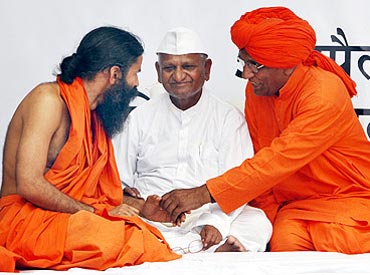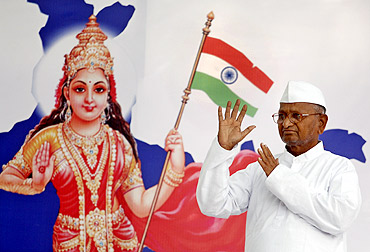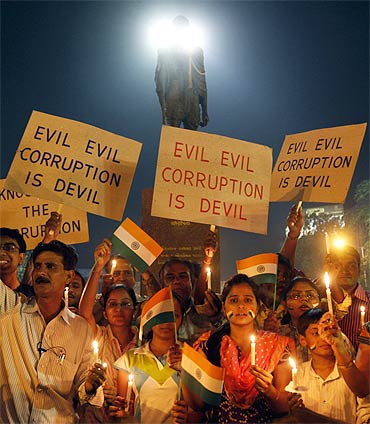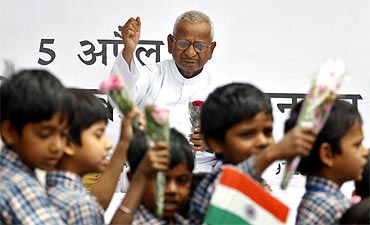 | « Back to article | Print this article |
Our fight a success thanks to the public: Agnivesh
He acted as a peacemaker between the Government of India and the Maoists following a series of attacks on security forces in Chattisgarh at the behest of Home Minister P Chidambaram. And today, social activist Swami Agnivesh is playing a crucial role in Anna Hazare's ongoing fight against corruption. In fact, the government agreed to 50 per cent representation of civil society members on the joint committee drafting the Lok Pal bill courtesy Agnivesh.
Rediff.com's Onkar Singh caught up with Hazare's key emissary as he recounted the talks with the government on the drafting of the much-talked about anti-corruption bill.
When did you receive a call from the government? Who made that crucial call?
Frankly speaking, we have been negotiating with the government for the last few months but nothing emerged out of the talks. It was only after Anna Hazare announced an indefinite hunger strike at Jantar Mantar, that I got a call from Kapil Sibal. He called at the end of the second day of the fast and asked if we could me. I told him that I would have to call him back.
But why did you need time?
I had to inform Anna Hazare and other members of the core group about the call from Sibal and chalk out guidelines for the talks.
Click on NEXT to read further...
'There was resistance to appoint Anna has panel's chairman'
What happened at the meeting?
Sibalji wanted to discuss the intricacies of the demands and how to go about it. I was accompanied by RTI activist Arvind Kejriwal. I told Sibalji that the talks could have been initiated on day one itself. Anyway, a beginning had been made. The government was ready to concede three of the five demands.
Why did the talks get bogged down?
I do not know what went on within the government circles, but there was some kind of resistance in agreeing to have Anna Hazare as the chairman. Secondly, they were refusing to issue a government notification. I am glad that they eventually gave in to our demand of issuing a gazette notification on the appointment of a drafting committee and make former law minister Shanti Bhushanji a joint chairman with Finance Minister Pranab Mukherjee.
There were several rounds of talks between the government and Anna's representatives. Various issues were discussed and communicated in writing and suggestions were made for alterations.
'Drafting panel to meet on April 16'
Did the Manmohan Singh government relent after Sonia Gandhi expressed her concern about corruption and virtually supported Anna Hazare's movement, or was it the support from the people which unnerved the government?
Sonia Gandhi did write to Prime Minister Dr Singh and sent a copy of her letter to Anna Hazare. It is a fact that the overwhelming response from the people in all parts of the country definitely played a major role in bringing Anna Hazare's indefinite strike to an end. I would say that it was the pressure built up on the government that actually led to the historic achievement.
When is the drafting committee meet?
According to the government, the drafting committee meets on April 16 in New Delhi around 11.30 am to discuss the Jan Lok Pal Bill as prepared under the guidance of Anna Hazare sahib.
'People forced government to accept our demands'
Swami Ramdev has criticised the presence of father-son duo Shanti and Prashant Bhushan on the joint panel of the ant-corruption bill.
The issue has been settled amicably. I have nothing further to add.
Is it true there was a fight among the core committee members of civil society over who should the get the credit after the government met your demands?
No. There was no such squabble. The credit should go to the people who forced the government to accept our demands.



